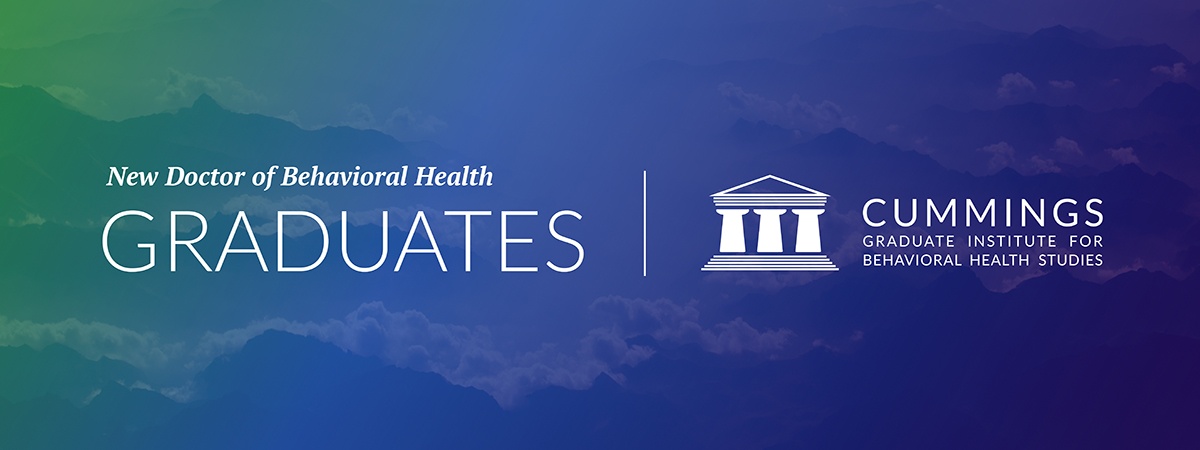
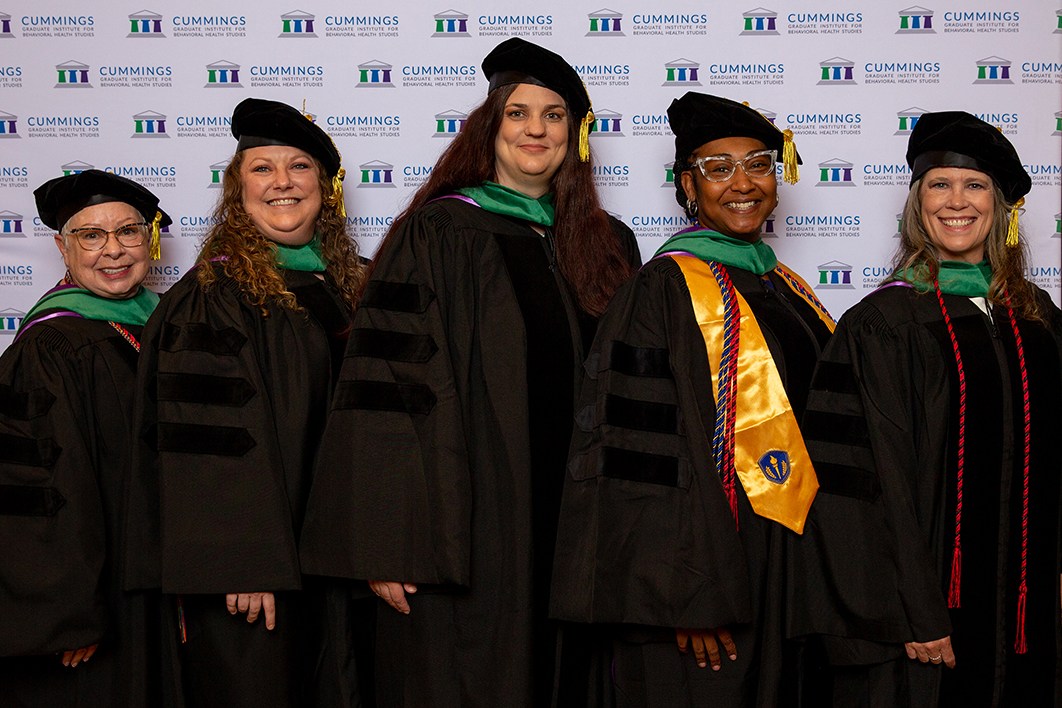 Cummings Graduate Institute for Behavioral Health Studies (CGI) is thrilled to announce the graduation of five new Doctors of Behavioral Health. Dr. Amanda Barnard, DBH, LCSW, MSW, Dr. Leslie Allison Earl, DBH, LBHP, LPC-S, Dr. Teranda Knight, DBH, CTMP, LSSGB, MS, Dr. Billie Ratliff, DBH, LCSW, MSW, and Dr. Diane Scott, DBH, LCSW, MSW completed the requirements for the Doctor of Behavioral Health (DBH) program. On April 27, 2023, the new graduates were celebrated at the DBH Commencement Ceremony in Tempe, AZ. CGI is honored to have worked with them during their studies and applaud them for their perseverance and tenacity as they completed their doctoral degrees.
Cummings Graduate Institute for Behavioral Health Studies (CGI) is thrilled to announce the graduation of five new Doctors of Behavioral Health. Dr. Amanda Barnard, DBH, LCSW, MSW, Dr. Leslie Allison Earl, DBH, LBHP, LPC-S, Dr. Teranda Knight, DBH, CTMP, LSSGB, MS, Dr. Billie Ratliff, DBH, LCSW, MSW, and Dr. Diane Scott, DBH, LCSW, MSW completed the requirements for the Doctor of Behavioral Health (DBH) program. On April 27, 2023, the new graduates were celebrated at the DBH Commencement Ceremony in Tempe, AZ. CGI is honored to have worked with them during their studies and applaud them for their perseverance and tenacity as they completed their doctoral degrees.
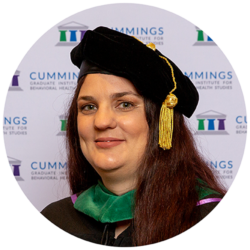 Dr. Amanda Barnard, DBH, LCSW, MSW
Dr. Amanda Barnard, DBH, LCSW, MSW
Dr. Amanda Barnard received her Bachelor of Social Work from the University of Wyoming in 2014. She worked at the Wyoming Department of Family Services, providing families with ongoing case management and reunification services. She completed her Master of Social Work from the University of Wyoming in 2018 and began working with patients experiencing serious mental illness in Dickinson, ND. Dr. Barnard started to take note of deficits in healthcare delivery and decided to increase her knowledge to improve healthcare in rural areas, which inspired her to pursue the Doctor of Behavioral Health degree. While enrolled in the DBH program, she earned full independent licensure as a Clinical Social Worker in North Dakota and established her business, Kahanalo Consulting, LLC, in 2020. Her venture provides clinical and consultation services to citizens of rural North Dakota. Dr. Barnard Earl earned her Doctor of Behavioral Health (DBH) degree from Cummings Graduate Institute for Behavioral Health Studies in 2023 and continues to provide consultation services, improving care access and experience in rural North Dakota.
Dr. Barnard’s culminating project, Integrating Psychiatric Rehabilitation and Food Pharmacy Interventions to Reduce Nutritional Deficits in Patients with Serious Mental Illness in Rural Locations, is a program designed to ease the burden of a workforce shortage in rural areas while increasing positive outcomes for patients. The project incorporates psychiatric rehabilitation services with a food pharmacy to reduce nutritional deficits in patients with a serious mental illness who are experiencing or at risk for physical disorders. By utilizing psychiatric rehabilitation in an integrated setting, the program may increase positive outcomes and increase access to care by using lower licensure staff to ease the burden of a limited higher-level workforce. Incorporating a food pharmacy has been shown to lower nutritional risks. It will reduce the stressors related to meeting basic nutritional needs while the patient is experiencing significant symptoms from behavioral health and physical disorders.
Learn more about Dr. Barnard’s culminating project.
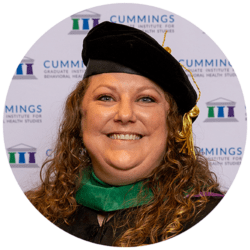 Dr. Leslie Allison Earl, DBH, LBHP, LPC-S
Dr. Leslie Allison Earl, DBH, LBHP, LPC-S
Dr. Leslie “Allison” Earl is a Licensed Professional Counselor, certified trauma specialist, clinical specialist in Autism Spectrum Disorder, and licensing supervisor for LPC candidates serving Oklahoma City, OK and surrounding areas. Dr. Earl initially pursued a career in education, where she discovered a desire to make an impact on patients in a clinical healthcare setting. She earned her master’s degree focused on Human Relations in Counseling from the University of Oklahoma and soon began working with Dr. Larry Ford, DBH, at Hands To Guide You, where she fully realized her passion for becoming a changemaker in healthcare. Dr. Earl is known for her work in the women’s health field in the greater Oklahoma City area. Dr. Earl believes integrated care is the key to identifying the root cause of illness, therefore gaining insight on how to best treat the whole person. Dr. Earl earned her Doctor of Behavioral Health (DBH) degree from Cummings Graduate Institute for Behavioral Health Studies in 2023.
Dr. Earl’s DBH culminating project is entitled Women’s Health Solutions, LLC: A trauma-informed women’s health initiative. The entrepreneurial-focused project is an all-encompassing program designed to start at the beginning of a patient’s confirmation of pregnancy through at least one year postpartum. Women’s Health Solutions, LLC offers therapy, case management, and non-clinical billables and currently operates as a subsidiary of H2GY Health in Oklahoma City, OK. When asked what she loves most about being a DBH, clinician, and LPC, Dr. Earl enthusiastically says, “Because I am a lifelong student – I love to learn, and I’m passionate about living optimally. I lead by example. I want to live my best life, and helping others do the same is my purpose!”
Learn more about Dr. Earl’s culminating project.
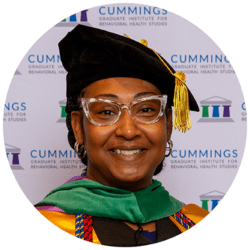 Dr. Teranda Knight, DBH, CTMP, LSSGB, MS
Dr. Teranda Knight, DBH, CTMP, LSSGB, MS
Dr. Teranda Knight obtained her Bachelor of Arts degree in psychology from North Carolina Wesleyan College and her Master of Science in psychology with a specialization in counseling psychology from Capella University. She holds a provisional clinical addiction specialist license with the state of North Carolina and certifications in lean six sigma and tele-mental healthcare. Dr. Knight earned her Doctor of Behavioral Health (DBH) degree from Cummings Graduate Institute for Behavioral Health Studies in 2023. Her career has expanded into healthcare, higher education, mental healthcare, substance use programs, and intellectual disability populations across the life spans. Throughout her work, Dr. Knight evaluates evidence-based approaches relevant to the Biodyne Model to improve the quality of care and service in integrated behavioral healthcare settings.
Dr. Knight’s culminating project, Integrating Healthcare in Higher Education: Accommodations for Chronic Substance Use with Cognitive Deficits, identified and evaluated accommodations offered for students in higher education environments with cognitive deficits driven by chronic substance use. Dr. Knight’s culminating project ascertained there were no processes currently available for identifying cognitive deficits in students of various higher education environments, and these institutions gathered very little information regarding substance use and treatment options for this population to improve campus and community safety by reducing suicide, homicides, and other criminal activities. The entrepreneurially focused project includes a business plan and menu of services that can be used to integrate behavioral healthcare into higher education settings so that the college student population can improve their academic success and health, and well-being while pursuing higher education.
Learn more about Dr. Knight’s culminating project.
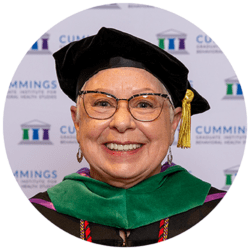 Dr. Billie Ratliff, DBH, LCSW, MSW
Dr. Billie Ratliff, DBH, LCSW, MSW
Dr. Billie Ratliff is a Licensed Clinical Social Worker in Colorado, Clinical Assistant Professor of Social Work for the Department of Social Work at the University of Colorado at Colorado Springs (UCCS), teaching both in the BSW and MSW programs, certified Trauma Informed Care Instructor and mentor, and a Co-Founder of Synergy Behavioral Health Solutions LLC, a consulting company specializing in assisting organizations change their culture to a Trauma-Informed framework. She earned a Bachelor of Science in Social Work from Murray State University, Murray, Kentucky and a master’s degree in social work from Washington University, St. Louis. Dr. Ratliff has recently retired from a 43-year career of working in healthcare settings, primarily hospitals, and most recently held the Director, Behavioral Health position in UCHealth Southern Region. Dr. Ratliff’s clinical specialty is developmental trauma and trauma-informed care. Dr. Ratliff earned her Doctor of Behavioral Health (DBH) degree from Cummings Graduate Institute for Behavioral Health Studies in 2023, where she developed and launched her business Synergy Behavioral Health Solutions LLC, in collaboration with her business partner and fellow DBH alumna, Dr. Diane E. Scott.
Dr. Ratliff’s culminating project, Sounding the Alarm: A Matter of Life and Death for Firefighters, results from a pilot partnership between the Rio Rancho Fire Rescue and Cummings Graduate Institute for Behavioral Health Studies. It is a four-module online course series hosted on an online learning platform, developed to increase awareness among first responders, including firefighters, paramedics, and emergency responders, of the impacts of trauma on health and mental health for this population. Specific learning outcomes included an increased understanding of trauma and the connection between untreated trauma and poor health outcomes for first responders; an increased understanding of the increased risk of poor coping skills, suicidal ideation, and lethality for first responders; and increased adaptive coping mechanisms for addressing trauma through help-seeking behavior, goal setting, and confidence building in giving and receiving peer support. In creating an online curriculum utilizing evidence-based behavioral health education and treatment, Dr. Ratliff and her co-author Dr. Scott aimed to increase firefighters’/EMTs/paramedics’ knowledge concerning suicide, developmental and event trauma, and self-care. Primary objectives were to teach first responders to change from the “suck it up” mentality to a trauma-informed mentality, identify and replace unhealthy trauma responses/symptoms early, and reach out for help to heal from events and developmental traumas.
Learn more about Dr. Ratliffs culminating project.
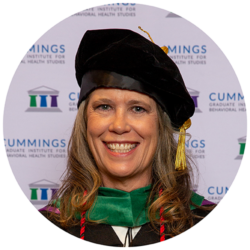 Dr. Diane Scott, DBH, LCSW, MSW
Dr. Diane Scott, DBH, LCSW, MSW
Dr. Diane E. Scott is a Licensed Clinical Social Worker, having earned both her BSW and MSW from the University of Alaska Anchorage. She earned a certificate in management from Duke University and is certified as a Trauma-Informed Care Practitioner, Instructor, and Consultant. Dr. Scott has over 25 years of experience working in the mental health field internationally and across the United States. She served as the Chief of Behavioral Health for the Soldier Readiness Processing Center at a U.S. Army installation. Her clinical and program management experience includes emergency, medical, and military social work. Dr. Scott is the co-developer of the “Trauma-Informed Peer-to-Peer Surveillance (TIPPS)” program and co-founder of Synergy Behavioral Health Solutions, LLC, which was developed in collaboration with her business partner Dr. Billie Ratliff while both enrolled in the Doctor of Behavioral Health (DBH) degree program from Cummings Graduate Institute for Behavioral Health Studies, where she completed the DBH program in 2023.
Dr. Scott’s culminating project, Sounding the Alarm: A Matter of Life and Death for Firefighters, results from a pilot partnership between the Rio Rancho Fire Rescue and Cummings Graduate Institute for Behavioral Health Studies. It is a four-module online course series hosted on an online learning platform, developed to increase awareness among first responders, including firefighters, paramedics, and emergency responders, of the impacts of trauma on health and mental health for this population. Specific learning outcomes included an increased understanding of trauma and the connection between untreated trauma and poor health outcomes for first responders; an increased understanding of the increased risk of poor coping skills, suicidal ideation, and lethality for first responders; and increased adaptive coping mechanisms for addressing trauma through help-seeking behavior, goal setting, and confidence building in giving and receiving peer support. In creating an online curriculum utilizing evidence-based behavioral health education and treatment, Dr. Scott and her co-author Dr. Ratliff aimed to increase firefighters’/EMTs/paramedics’ knowledge concerning suicide, developmental and event trauma, and self-care. Primary objectives were to teach first responders to change from the “suck it up” mentality to a trauma-informed mentality, identify and replace unhealthy trauma responses/symptoms early, and reach out for help to heal from events and developmental traumas.
Learn more about Dr. Scott’s culminating project.
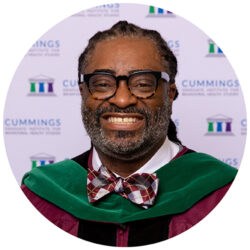 When reflecting upon the new graduates’ accomplishments, Dr. U. Grant Baldwin, Jr. DBH, Director of the DBH program, shares,
When reflecting upon the new graduates’ accomplishments, Dr. U. Grant Baldwin, Jr. DBH, Director of the DBH program, shares,
“I want to personally say how proud I am of these scholars for successfully completing their doctoral journey. Each graduate has demonstrated the ability to find their own unique voice as they matriculated through the DBH program with the support of our amazing administrative and academic team and their family and friends. This group of graduates embody the “true spirit” of being a disruptor in health care and will challenge the inequalities seen to ensure that all people have access to the quality healthcare they deserve.”
Each new DBH graduate brings a unique perspective on improving healthcare as a Doctor of Behavioral Health. CGI looks forward to seeing the improvement their new graduates make to healthcare delivery and patient care.
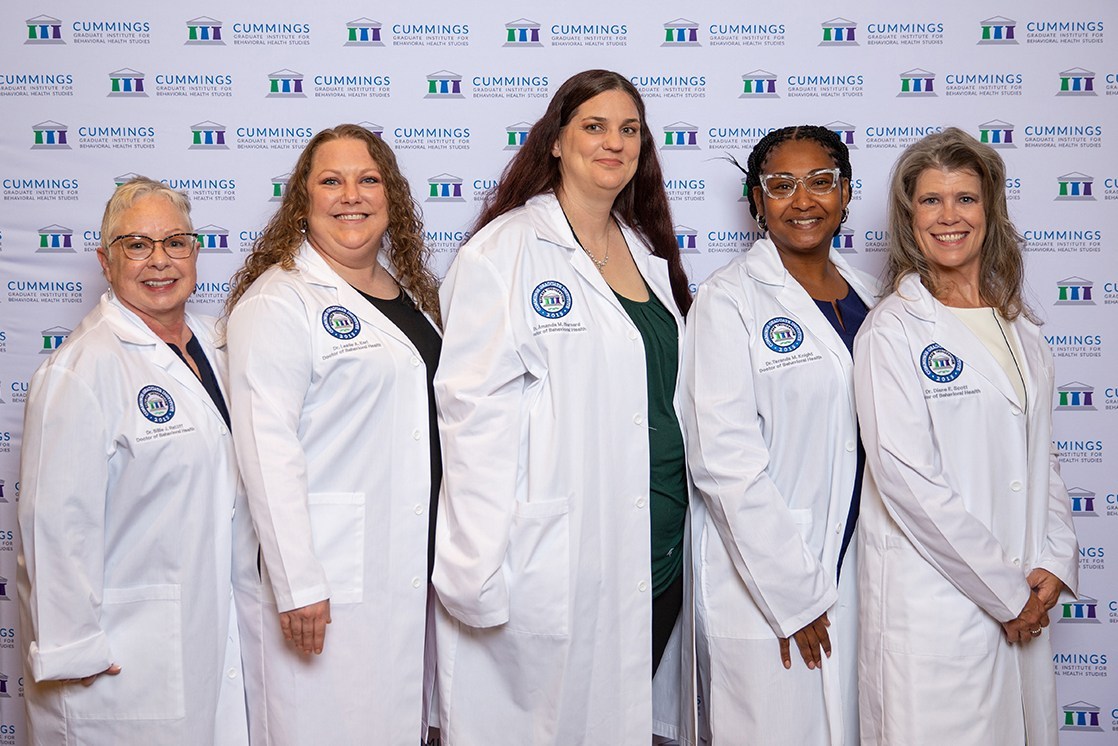
Relive the joy of the DBH Commencement Ceremony honoring Dr. Amanda Barnard, DBH, LCSW, MSW, Dr. Leslie Allison Earl, DBH, LBHP, LPC-S, Dr. Teranda Knight, DBH, CTMP, LSSGB, MS, Dr. Billie Ratliff, DBH, LCSW, MSW, and Dr. Diane Scott, DBH, LCSW, MSW below.
About Cummings Graduate Institute for Behavioral Health Studies (CGI)
Cummings Graduate Institute for Behavioral Health Studies is a nonprofit, DEAC-accredited, online post-graduate institution of higher learning offering post-graduate education and training in the field of integrated behavioral healthcare. CGI is focused on meeting the healthcare industry’s need for a highly-skilled workforce to support an integrated approach to addressing patients’ needs. To learn more about CGI, visit, https://cgi.edu/.
For further information or to arrange interviews, contact:
Cummings Graduate Institute for Behavioral Health Studies
Melissa McGurgan
melissa@cgi.edu






























